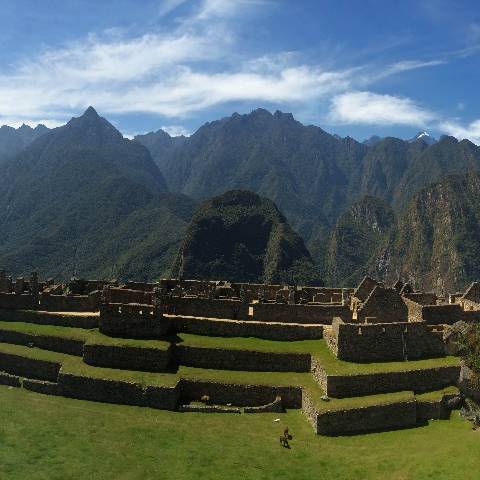

Last spring, I was very fortunate to be awarded a Thatcher Master Teacher Fund grant to travel with my wife Ashley (ELA-8 Spanish teacher) to Peru and Bolivia. The trip was much more of an adventure than it was a relaxing vacation, but in no way is that a complaint. To understand more about our travels, you can also read Señora Evans’ blog.
I thought I might just list a few things I learned on our trip. I hope you enjoy reading them.
1. Peruvians have a unique tie to their past. We visited several museums and checked out the colonial and Incan architecture throughout Cusco, once the capital city of the Incas, during our first few days of our trip.
Listening to several guides and speaking to locals, we really began to understand that the Peruvian people look back to their Incan ancestors with tremendous respect. Behind the stories and pride, you also get the feeling that there is a longing for what might have been. In the mid-1500s the Spanish conquistadors killed or imprisoned the Incan leaders, dismantled a growing empire, and forced Catholicism amongst its people after tearing down their temples and building cathedrals on top of the ruins.
It is easy to understand this sentiment when Incan walls that were built without steel tools or the wheel still stand after 500 years and two massive earthquakes. The ruins of temples and buildings scattered throughout Peru seem to personify the desire of a people who want to connect to a past that is riddled with holes because it has no written history.
2. There is a growing clash between development and tradition. When we signed up for this trip, we knew that part of the cost would go to members of the Quechua community through which we hiked. One family was given 15 alpacas, paid for by the group with whom we traveled. Andina Travels, the company that gave us our guides and carried our supplies from camp to camp via mule, has also partnered with several communities to help reestablish traditional practices like weaving amongst the younger women.
Despite knowing that we were offering a little aid to a community, it was hard not to see the double-edged sword that tourism can bring to tradition. Nowhere was this more evident than at the “floating islands” of Lake Titicaca. Without tourism, these reed islands might have been abandoned along with the practices necessary for living in this environment. Few people still live on the floating islands but tourism has helped preserve their existence by giving them a steady flow of income. Still, it is impossible to miss the impact of tourism when the largest of the islands now has reed hut hotels and general stores where you can quench your thirst with a Coke.
3. Any edifice is an advertising opportunity. Apparently there is no need to waste money on political campaign signs. All you need in Peru or Bolivia is a wall and a paintbrush. Driving through the countryside, any roadside wall was more than likely painted with a political campaign ad. Painted soccer balls with the party’s name written on it, traditional Incan warrior faces, sandals, and farm tools were the items most often paired with the name of someone running for local office.
4. The Darlington students who created the Honor Code 100 years ago must have spent some time in Peru. Our first day in Cuzco, we took a taxi from the airport to the hotel. My Spanish is a little rusty but I couldn’t help but notice the taxi driver saying, “No mentir. No robar.” The third phrase I did not understand but we were able to clarify it with some further discussion.
What he was telling us was that the Quechua people still use an old adage, which translates to “Don’t lie. Don’t steal. Don’t be lazy.” We actually heard several people translate the “Don’t be lazy” as “Don’t cheat.” The Quechua phrase for this was “Ama sua. Ama llulla. Ama quella.”
We were quite amused to hear that the Quechua saying was so similar to Darlington’s own Honor Code of “Don’t lie, don’t cheat, don’t steal, and don’t tolerate others who do.”
5. The destination is amazing but the journey is what it’s really about. Before our trip, both of us would have said that Machu Picchu was the thing we looked forward to the most.
Machu Picchu did not disappoint. I was in awe of the massive blocks that had been moved up mountains and sculpted to perfection to form the Incan city. Every view from both inside and outside of the city was magnificent. Still, the struggles we faced and the people we met along the way are things that we find ourselves reminiscing the most.
I could certainly go on with the many things that had an impression on me on this trip like Ignacio, the 62-year-old Peruvian who trekked with us in sandals and never looked tired, altitude sickness, freezing temps camping in the Andes, the luchador match we saw in La Paz, or the corruption amongst public officials especially in Bolivia (great for me to see as a government teacher).
If you want to know more about our trip, we would be happy to share more of our adventure. I can’t thank Darlington and the Thatcher Master Teacher Fund enough for giving us this opportunity. I know that I will be able to use this experience in my teaching, and I hope that this will create an opportunity for students to do a similar trip in the near future.